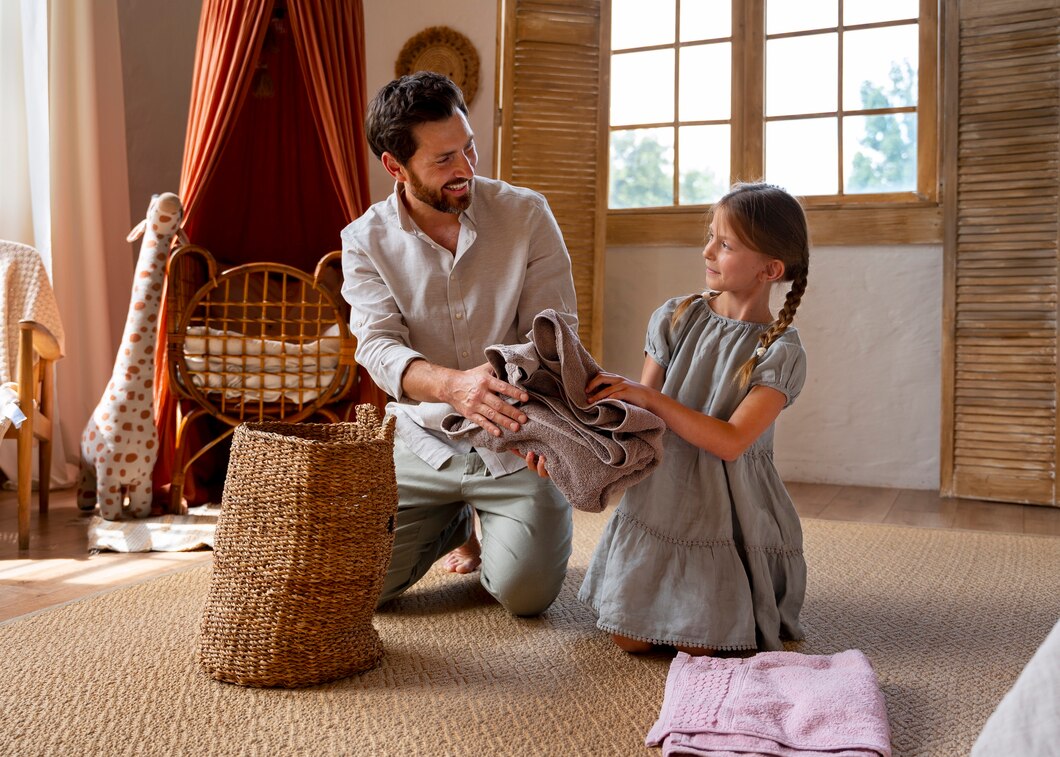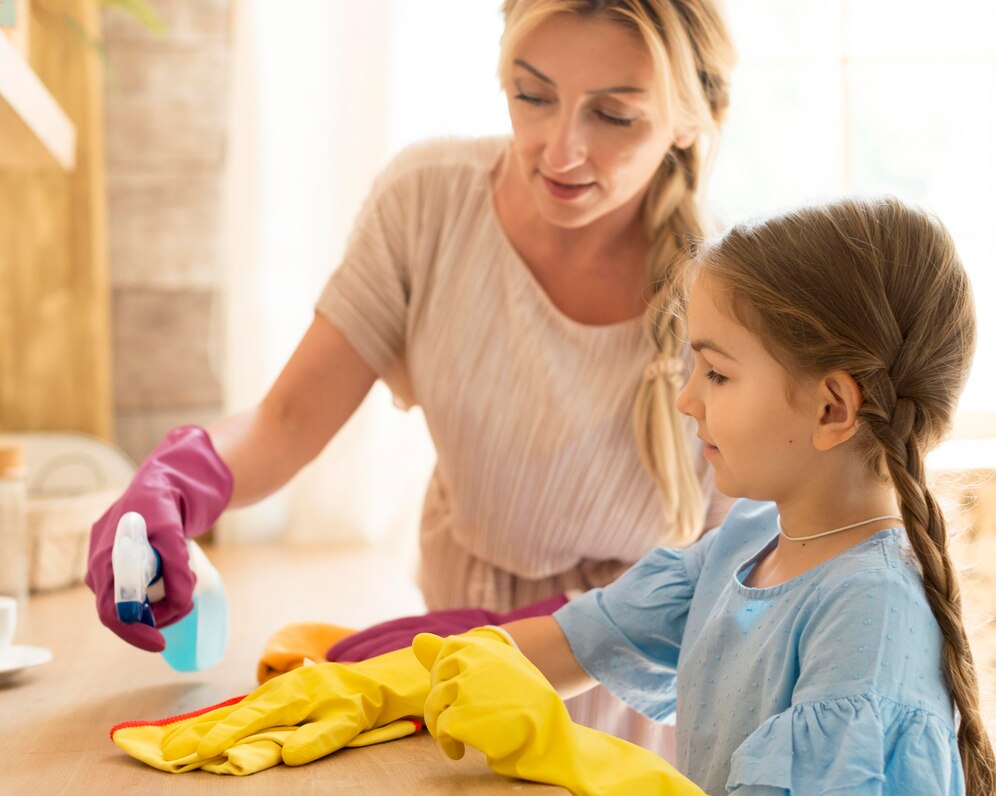
The Role of Chores in Teaching Kids Responsibility
Raising confident and independent children is a goal many parents strive for. Yet the path to achieving this can often be fraught with challenges. One effective method to instill a sense of responsibility in children is through the assignment of chores. Chores may seem boring, but they can teach kids important lessons. Kids learn responsibility, teamwork, and self-reliance through these tasks.
In this blog, we will explore how chores teach responsibility, discuss the best age-appropriate chores for kids, and offer strategies on how to encourage kids to help at home.
Many children and some parents resist the idea of kids doing chores. Parents often wonder if it’s right to give children responsibilities when they’re young. However, realising how chores help a child’s growth can change this view. Integrating chores into daily routines helps parents teach kids important life lessons. These lessons go beyond just home life.
Key Benefits / Why It Matters

How Chores Teach Responsibility
Chores serve as a practical tool for teaching children about responsibility. When kids get tasks, they learn to own their responsibilities. They also see how their actions have consequences. This sense of accountability is crucial for their development into responsible adults. Doing chores helps kids see that their work is important. It keeps the household running smoothly.
Moreover, chores can instil a sense of pride and accomplishment. When children finish a task, they get a sense of achievement that boosts their confidence. This confidence can translate into other areas of their lives, such as schoolwork and social interactions. Chores also teach kids about time management and prioritisation. These skills are important for both personal life and work.
Real-Life Applications
Incorporating chores into a child’s routine can have profound real-life applications. A child who helps with meal prep might grow to love cooking. This can spark a lifelong passion or even a career. A child who learns to manage time well through chores will likely do better in school and activities. Doing chores teaches skills that help kids succeed later in life.
Step-by-Step Guide / Actionable Insights
Best Age-Appropriate Chores for Kids
Assigning chores should be a thoughtful process. Take into consideration the child’s age, abilities, and interests. Here are some age-appropriate chores that can help teach responsibility:
Ages 2-3
- Picking Up Toys: Encourage toddlers to put away their toys after playtime. This simple task teaches them about organisation and tidiness.
- Wiping Spills: Provide a damp cloth for wiping small spills. This helps develop motor skills and instils a sense of cleanliness.
Ages 4-5
- Setting the Table: Involve children in setting the table for meals. This task teaches them about mealtime etiquette and responsibility.
- Feeding Pets: Assign the responsibility of feeding pets. This fosters empathy and care for living beings.
Ages 6-8
- Making the Bed: Encourage children to make their beds each morning. This task promotes discipline and a sense of accomplishment.
- Watering Plants: Assign the task of watering household plants. This teaches children about nurturing and environmental responsibility.
Ages 9-12
- Vacuuming: Involve children in vacuuming common areas. This task teaches them about cleanliness and teamwork.
- Assisting with Laundry: Encourage children to sort and fold laundry. This task promotes organisational skills and responsibility.
How to Encourage Kids to Help at Home
Encouraging children to participate in chores can sometimes be challenging. Here are some strategies to motivate them:
Make It Fun
Transform chores into a game or competition. For example, set a timer and see who can pick up the most toys in a minute. This adds an element of fun and excitement to the task.
Offer Praise and Rewards
Acknowledge and praise your child’s efforts. Positive reinforcement can boost their motivation and encourage them to continue helping. Consider offering small rewards for completed chores. Rewards may include extra playtime or a special treat.
Set a Routine
Establish a consistent routine for chores. When children know what to expect, they are more likely to take responsibility for their tasks. Create a chore chart to track progress. Provide a visual reminder of their responsibilities.
Lead by Example
Children often emulate their parents’ behaviour. Demonstrate a positive attitude towards chores and involve your child in tasks you are completing. This sets a positive example and reinforces the importance of contributing to the household.
Additional Expert Tips & Common Mistakes to Avoid

Best Practices Beyond the Basics
- Involve Children in Decision-Making: Allow children to choose some of their chores. This gives them a sense of control and ownership over their responsibilities.
- Be Patient and Consistent: Understand that children may not complete chores perfectly at first. Be patient and provide guidance as needed. Consistency is key to developing good habits.
Common Mistakes and Misconceptions
- Expecting Perfection: Avoid expecting perfection from children when they are learning new tasks. Focus on progress rather than perfection.
- Using Chores as Punishment: Chores should not be used as a form of punishment. This can create negative associations and reduce motivation.
Advanced Insights / Expert Recommendations
Unique Industry Perspectives
Educational psychologists say that chores can help a child’s social and emotional growth. By doing household tasks, children learn about cooperation, empathy, and the value of hard work. These skills are essential for building strong relationships and succeeding in collaborative environments.
Lesser-Known Insights
Kids who do chores often feel better about themselves. They also do better in school. Doing chores helps kids feel responsible and accomplished. This is good for their growth.
From Small Tasks to Big Lessons: How Chores Shape Character

Chores play a vital role in teaching children responsibility, confidence, and independence. Adding age-appropriate chores to your child’s routine helps them learn important life skills. These skills go beyond just home tasks. Encourage your children to participate in household tasks and celebrate their contributions.
As parents, it is essential to foster a positive environment where children feel motivated to help and learn. Try using some strategies from this blog to help your child take charge of their chores. By doing so, you are setting them on a path toward becoming confident, independent, and responsible individuals.
What chores will you introduce to your child’s routine today? Share your experiences and insights in the comments below.